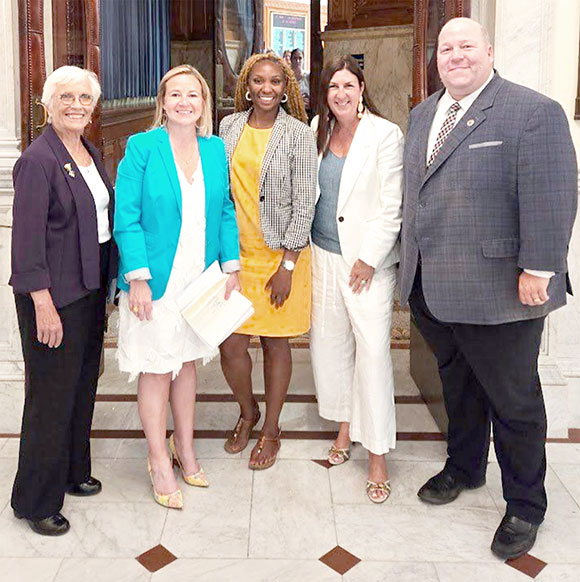(The opinions and views expressed in the commentaries and letters to the Editor of The Somerville Times belong solely to the authors and do not reflect the views or opinions of The Somerville Times, its staff or publishers)

By State Senator Pat Jehlen
There is so much happening in the legislature (not to mention the world) the last two weeks of July! Conference committees are resolving differences between many bills that have passed both houses.
WAGE TRANSPARENCY
The Senate passed our Wage Transparency bill last October. But it was a little different than the House version. However, the work of the conference committee to resolve the differences took nine months, partially because of the departure of my co-chair of the Labor and Workforce Development Committee Josh Cutler.

My conference committee co-chair Rep. Danielle Gregoire, members Reps. Brandy Fluker-Oakley and Hannah Kane, and Sen. Paul Feeney and I filed our report and both branches passed the Wage Transparency Bill last week. We hope and expect the governor will sign it soon!
Posting Pay Ranges
The legislation requires employers with 25 or more employees to disclose a salary range when posting a position.
The bill builds on our 2016 Massachusetts Equal Pay Act, which prohibited wage discrimination based on gender, and banned employers from asking about applicants’ salary history. You can read more about that here and here.
Asking for salary history can lock women and people of color into lower salaries for their whole careers. They start out with lower pay, and never catch up, and end up with lower retirement benefits and less financially secure. Since we passed that bill in 2016, 18 other states have adopted the ban on salary history. Now 10 states have expanded access to pay range information as our new bill does.
We know for sure that those laws reduced the gap for many people. A 2020 study showed salary history bans alone increased pay for all job changers, especially for women and Black workers.
This bill goes farther than our 2016 law, in requiring salary range disclosure so that applicants have more information in negotiations. It also helps both employers and applicants because it will avoid time in interviews if applicants know they won’t accept the salary.
Data Collection
The bill requires employers with more than 100 employees to share their federal wage and workforce data reports with the Executive Office of Labor and Workforce Development), which would then compile and publish aggregated wage and workforce date to help identify gender and racial wage gaps by industry.
Justice for Retirees
The final part of the bill addresses a set of income inequities affecting public service retirees. Because of strict administrative reading of the retirement law, retirees were kept from using their recent Equal Pay Act wage increases in calculating their retirement benefits. This change, recommended by PERAC, and incorporating another of my bills, remedies unfair interpretations.
GUN CONTROL
On July 18 we passed a firearm safety reform bill. A good summary was in the Globe.
Protecting Communities from Gun Violence. The bill criminalizes discharging firearms at or near dwellings, and prohibits carrying firearms on school buses, polling places, and government buildings with an exemption for law enforcement.

The bill improves training for those who want a license to carry. It expands the list of who may petition a court for an “extreme risk protection order” to include school administrators and medical professionals. I always remember the young people, including my granddaughters, who marched on the state house to demand passage of the Red Flag law.
That law gave families the right to ask a court for an “extreme risk protection order” to prevent someone from carrying a gun if they knew that person was a threat to themselves or other people. That bill seemed to be going nowhere before the young marchers showed up. Their pressure made the difference.

Modernizing Massachusetts Firearm Laws. Between 2019 to 2021, the Boston Police Department alone saw a 280 percent increase in the number of untraceable “ghost guns” it recovered on the streets. The bill cracks down on ghost guns and 3-D printed weapons. At left, a display of seized guns.
Locally. I hope this law will help prevent future tragedies like the recent fatal shooting in Somerville, as well as the December death in Winchester. It’s shocking how many other incidents of shootings have happened just recently in Medford, Somerville, and Cambridge in May and July.
More very soon on the end of session flurry, including my work. on the Long Term Care and Assisted Living bill.















Reader Comments